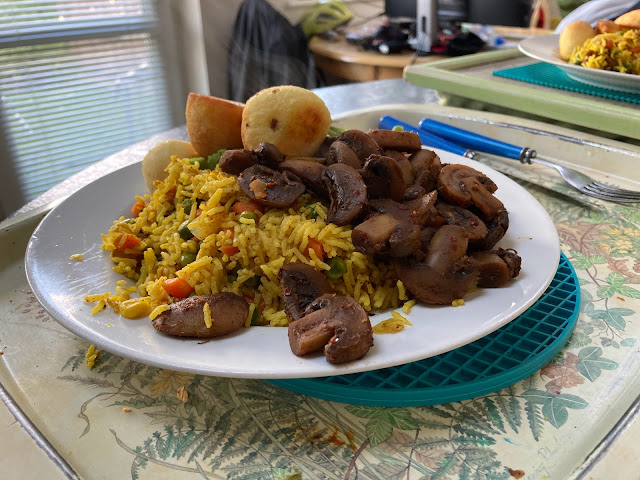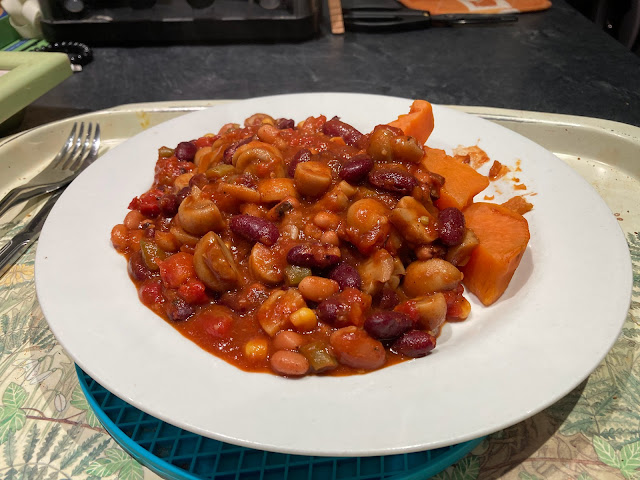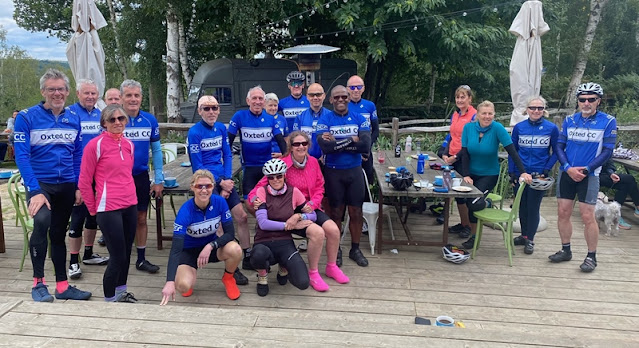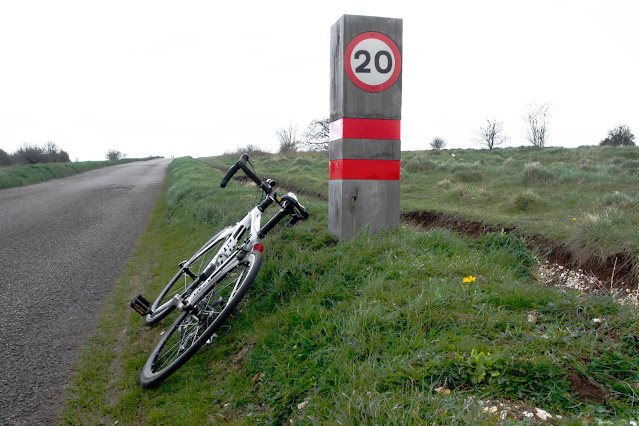 |
| mushrooms instead of roast beef |

Cycling and more. This blog started as a way to broadcast my photography and how I created it, to document my thoughts about it. Then I talked about my other passion; cycling. But with the events of 2020 it became much more. I opened up about my depression. At first it was easier to type here than talk. Please click on the Macmillan cancer support link to sponsor my half marathon run in May.
Sunday, 16 October 2022
Controversial mushrooms
Thursday, 6 October 2022
Why I joined Oxted Cycling Club
I started riding as an adult in 2005. At first just to do a charity ride of 15 miles. The next year I agreed do to 50. That meant some training. I was given a bike and half heartedly rode a bit more. After that a friend and I committed cycling together at weekends. We quickly got fitter but didn’t venture very far; about 40 miles in total spread over the two days. We did at first find new routes, all with a similar distances.
Occasionally I went further, Brighton, even Paris. The first of two RideLondon’s meant I bought a second hand road bike. Before then even the long trips were on my trusty Kona mountain bike.
I bought a better road bike just before Covid. I had lots of time off, but no-one to ride with and no cafes. As the restrictions were eased I knew I had to broaden my riding horizons. Of course without forgetting about friends who kept me going over so many years. I spilt the weekend between the two.
I hadn’t considered joining a club before, I thought they were all just riding fast on expensive bikes. I wanted more social occasions. It was then I recollected a sportive from a few years previously. It had been a very hot day and by the time I got to the last food stop I was pretty much finished. I don’t remember how I got talking to Pat and Amanda who were riding a tandem but their Oxted Cycling Club jerseys remained in my memory. Pat gave me a couple of energy gels and said they should be enough to get me the final 15 or so miles. They rode off and a short while later so did I. I thanked him again when I got to Canterbury.
So when I started my search for a club; Oxted was my first choice. The chairman, Russell, was very welcoming and after two rides I knew my preconceptions about cycling clubs were wrong. I joined and am very glad I did.
Everyone in the club has been friendly and encouraging. I’ve ridden TT’s and much bigger distances than I thought I could. I can choose the type of ride I feel like doing. Either a gentle social ride or a faster, social ride. We nearly always include a cafe stop. Cycling and coffee have a very close bond. Chatting before a ride, then over coffee is a very pleasant way to spend time. I have more great friends. And the routes I now ride are more varied, with an expanding list of great cafes too.
I'm not sure exactly how many are in the club, but there is always a good turnout, even during the winter. Many rides bring everyone from the different groups together at the same cafe.
When I had a crash everyone came together. Family and friends supported me, being part of a club made a big difference. I had advise, practical help and encouragement. Having those three spheres backing me definitely aided my recovery.
You don’t need the latest bike or expensive clothing, just keep it all well maintained and comfortable. There is plenty of advice available when needed.
Has cycling got a problem?
What’s the problem you ask?
Divercity.
I don’t think cycling actively excludes anyone. Please tell me if I'm wrong.
It bothers me that I mostly see people like me generally riding or
attending cycling events, taking part in sportives etc. My club has less
women and other ethnicities as members. It’s a very welcoming
environment so I know we aren’t disuading or preventing anyone joining.
Cycling has a safety issue, I know that will put a lot of people off. This will only improve when society, media, the police and government have a change in attitude and priorities.
I do my best to push for safer roads. Through contacting my local councilors and MP and reporting bad driving to the police. Unfortunately I don’t feel I’m gettig very far. I support organisations that are doing this nationally.
When I watch racing it’s the same. Although I think that’s more influenced by money. Wealthier countries have run schemes to encourage racing at a young age, and to continue that support until pro teams become involved. They also have many pro teams to increase the scope for making a living from the sport. These organisations choose from those available; so it again comes back to creating a more diverse community.
Cycling needs investment in developing countries if they aren't to follow us and have the car become dominant.
We need to do this to ensure people aren’t left behind as cars are seen as too polluting and expensive to use. Cycling needs to become a viable means of transport for the majority, especially in urban areas.
It’s frustrating that the solution could be as simple as making cycling safer.
When it’s seen as normal for everyone we will see more divercity at all levels. Maybe it's more complicated than I think.
What have I missed? What other barriers are there? What can I do?
Monday, 19 September 2022
Radical
I read somewhere that as you get older you are more settled in your views. You become less radical and prefer to keep things the way they are.
I seem to be the opposite.
A couple of years ago, global warming, veganism, pollution and active travel were just things I heard or read about.
Now they are issues I am becoming more passionate about.
We can't go on consuming as we do, polluting the environment, and largely ignoring alternatives to driving.
At the moment all the news is about EV's (electric vehicles), almost exclusively cars and vans. Much less that of e-bikes and scooters, except to criticise them. But EV come with many downsides, you cut tailpipe emissions, conveniently forgetting parking and charging. If they replace like for like most will be parked on the road, or more likely on the pavement; multi car homes don't have off street parking for all the vehicles. This causes danger for pedestrians, they often block cycle paths, so riders are endangered. They are usually bigger and heavier, damaging paths, and wearing out roads faster. Brake dust and particulates from tyres are a big problem that is seldom discussed. How are the cars going to be charged if they aren't close to the power point? Cables can't be allowed to block pavements. Why are local councils expected to foot the bill to install power points? We should be moving towards less cars by investing in alternatives. The batteries are very environmentally and socially damaging to produce and dispose of. All motor vehicles are too fast, the e-scooters for hire have speed limiters yet the most dangerous road users don't.
Flying; foreign holidays really took off when people were persuaded that only a fly away destination was acceptable. Further advanced by cheap travel achieved by bigger planes and subsidies: no VAT is paid on kerosene for example. I have been just as guilty as anyone else; not anymore. At the same time in the UK high speed long distance train travel has become more expensive, less convenient and unattractive. I know it's said travel broadens the mind, but does it have to come at so high a price to the environment?
Agriculture: especially meat and dairy. Huge implications are built into this food production method. From the antibiotics given to the animals, pollution of waterways by run off to deforestation to rear them and the grow of their food. This sector is also a big generator of greenhouse gases. Not forgetting the cruelty of the process and the detrimental effect it has on human health.
Fish: despite the industry assurances it's not sustainable, and is wreaking huge damage to the environment. Passing the poisons we pump into the sea up the food chain to us - PCB and plastics - being the biggest concerns.
Road building: continued expansion isn't the answer; look up induced demand for an explanation. Use the money to link towns and cities with cycle paths and subsidise reliable public transport.
All of the above causes increased costs for the NHS in so many ways.
Clothing or the fashion industry: similar to tech; we are constantly bombarded with advertising to induce us to buy more. To replace what hasn't worn out. Too much daytime TV is focused on this. The implications are widespread: questionable labour practices, pollution, unsustainable land use expansion and general waste.
I try to keep my posts positive, this one could be if society starts to make the right choices. Government has a big part to play, and so have we.
Sunday, 4 September 2022
Travel for free
Cafe chat on bank holiday Monday.
"Isn't it great that you can ride your bike to anywhere, and it doesn't cost anything."
Matt is right, up to a point. Destinations over about 100 miles would need an overnight stop. You could wild camp for free, with landowners permission. Otherwise it's a B&B. This would be even easier if main roads had segregated cycle paths. They tend to be flatter and more direct than the quieter roads that are safer for riders. It is encouraging to hear that HS2 may have them.
Now riding to work a few days a week. He is fitter, has lost weight and is saving a lot of money. There are sections of the route that cause concern, the interaction with other roads users is the reason.
I have written posts about my thoughts on this. A big change in attitude is needed from government, media, drivers and motor manufacturers. Road violence has to be seen as a serious danger. It cannot be dealt with lightly, as it is at present.
I visited my mum and sister yesterday, a round trip of 32 miles. Completed in not much more time than it would have taken by car. No cost or pollution. I went to a bbg a few weeks ago, another a very pleasant ride. Obviously traveling as a couple we would need the car. How many other people without health issues drive because they don't consider an alternative even for very short distances. Many people will drive as little as 2 or 3 miles.
The National Travel Survey 2021 makes for some interesting reading. Did you know that 72% of all journeys undertaken in the UK are under 5 miles. A manageable distance for many people on a bike, yet over 50% of these journeys are driven. That’s 18 billion journeys that could be cycled.
Maybe some of those needed to be motorised; could an e-bike have been an alternative for a few? How many were local deliveries? Cargo bikes are increasingly being used for quite bulky items, and people.
Disabled people, depending on their condition, can find walking difficult but riding isn't. Another reason to make our roads safer.
Local businesses see a rise in revenue where more active travel options are provided. Crime is reduced, making our streets safer.
Community spirit is often said to be lacking in our villages, towns and cities. This could be improved if we get out of our cars and interacted with our neighbourhood.
The weather was fine for the ride yesterday; I have ridden it in the rain. I'm not made of sugar so I didn't dissolve. I just put on a jacket.
Wednesday, 31 August 2022
Need for speed
I was awoken from an afternoon kip on bank holiday Monday by the sound of a motorbike being ridden at speed not far from my house. I often hear car drivers doing the same. It got me thinking about a post a made from 2020 called 20 is plenty. I use the same picture as I did back then, because nothing much has changed.
Most drivers admit to speeding, the media don't take it seriously. Car and motorbike ads still push speed and performance. Reviewers encourage driving aggressively, especially on country lanes. These are statistically the most dangerous roads, especially for vulnerable users. Until attitudes change so that it is seen in the same way as drink driving; our roads will continue to kill almost 1800 people every year, that's around five a day.
There is technology to stop speeding. But the new laws mandating limiters allow an override; why?
I occasionally watch those fly on the wall police programs, they usually include a high speed persuit. Always deemed dangerous; they would be very much safer, or not happen if the driver couldn't exceed the speed limit.
My local councillors and MP's are a mix of it's not my responsibilty and not interested.
There are other measures that can be taken to make our neighborhoods safer: altering side roads to prevent them being used to avoid main roads, (rat running). Stop pavement parking. Setup school streets to encourage alternatives to the car school run. Organise groups of children into cycle buses. Play streets. Safe, secure storage for bikes. Unfortunately these will need those who can implement them to have more determination, and not be persuaded by a vocal minority. London boroughs have installed some of these schemes, and councillors have been re-elected, saying they will keep them and install more. So residence want them.
Police forces need to be more consistant in their treatment of bad driving reports, and be better funded.
Courts have to acknowledge the part they play. Harsher sentences and stop accepting undue hardship defences.
Figures from the Driver and Vehicle Licensing Agency (DVLA) show that neary 9,000 drivers still hold a licence despite exceeding the 12-point threshold.




